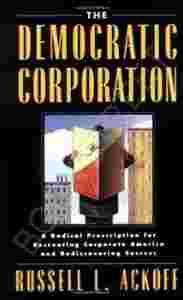|
We all know that American business needs fixing,
and there is no shortage of prescriptions: imitate the
Japanese, or follow the example of successful firms, or
practice right-sizing. But these approaches do not work
very well, says Russell Ackoff, because they only attack
the problem piecemeal—and it is the entire system of
American business that is flawed. In this revolutionary
new book by a widely respected business thinker and
pioneer in the fields of operations research and systems
thinking, Ackoff underscores the urgent need to overhaul
the kinds of systems found in America, from our business
schools to our boardrooms. And he shows how firms can
break out of the mold—and leapfrog the competition in
today's volatile economy.
To give managers
insight into the concept of organizations, Ackoff shows
how they have been viewed since the Renaissance: first
as machines, later as organisms, and today as social
systems. As social systems, companies produce and
distribute wealth and raise our standard of living. They
are also responsible for facilitating and encouraging
the development of the larger systems that contain them
and all their stakeholders. The quality of worklife
within an organization is key. Work has to be
challenging and enjoyable if workers are to give it
their full commitment, and Ackoff outlines major ways to
achieve this goal. Along the way, Ackoff explodes a
number of fashionable business notions. He asserts that
firms that try to imitate successful competitors are
doomed to play catch-up forever. He attacks the idea of
continuous improvement, showing that it has failed to
make quantum leaps in quality, and he demonstrates how
to re-orient the pursuit of quality. After revealing the
weakness in many current practices, Ackoff describes
three organizational schemes that will lead to success.
In the Circular Organization, a democratic hierarchy,
everyone participates directly or indirectly in
decisions that affect their work. In the Internal Market
Economy, organizations treat their different parts like
a collection of firms doing business with each
other—which promotes cooperation and eliminates wasteful
internal competition. And with the Multidimensional
Organization, a company becomes so powerful and flexible
that continuous adaptation can happen without
reorganization.
Ackoff caps off the book with an
incisive critique of business schools, describing how
they must be transformed to turn out the leaders we need
for the competitive American organization of the 21st
century. Enabling managers to understand the profound
interrelationships in the American economy and to tap
into them for success, The Democratic
Corporation is a major work by an innovative
thinker that is certain to cause ripples throughout the
business community.
|
|

